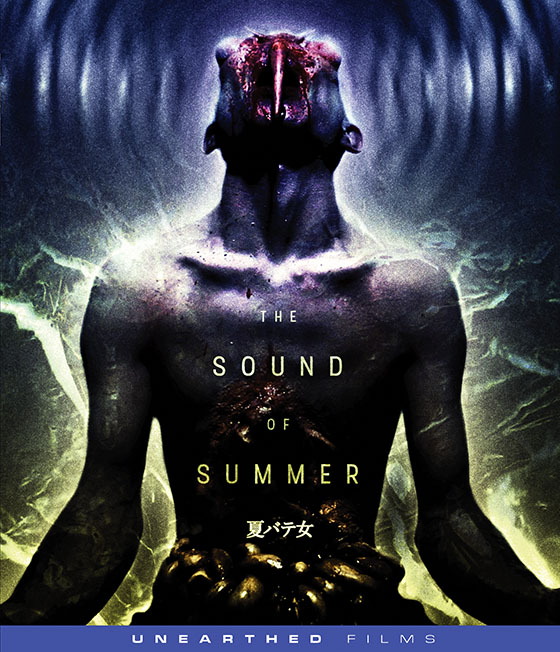The world is like a blast furnace, sweat dripping from every pore. It’s hot enough to drive a person mad, right? Swimming through the humidity of seemingly never-ending day, the piercing cries of the cicadas are all that you can perceive while just. trying. to. get. home. Do you know The Cicada Man? They say he stalks his prey, embeds cicadas beneath the skin of his victims. Can you feel them burrowing? It’s fine. Flesh gives way very easily. You must get them out. Get them out before they crawl in too deep; too deep to retrieve. It would be so much easier if you could just get a break from all this heat and noise, but it’s just relentless. The cicadas are screaming, they are coming home. They live in you now. And The Cicada Man is already here.
Watching The Sound of Summer is like feeling a blast of feedback to the face. We follow the unnamed protagonist and her spiral into madness (or is it?) on an exceeding hot and uncomfortable day. This is not a film for those who want to relax. It’s loud. It’s graphic. It’s abrasive. It’s disorienting. And this is why it is so effective in putting you into the mindset of the anonymous she. You feel how oppressive the summer heat is. The siren song of the cicadas is an ever-present backing track throughout the film, intensifying as it goes. The practical effects of the body mutilation are quite convincing, adding to the unsettling effect the film has. In an interview in the extras, when British-born director Guy is asked what his inspiration was for The Sound of Summer, he immediately says that it was Shozin Fukui (964 Pinocchio, Rubber Lover), and it’s clear from the first frames of the film that he isn’t just saying that because Fukui happened to be present at the panel where the question was asked. The Sound of Summer bears a lot of aesthetic similarity to Fukui’s work and in particular reminds me of the vaguely nauseous careening camerawork and unflinching visceral spectacle of 964 Pinocchio. It’s bracingly refreshing in a way compared to the more assembly-line product films of a company like Blumhouse or one of the major Hollywood studios, but it is also a film that is hard to recommend to the average person. For me personally though, I could take my eyes off of it.
Unearthed has delivered a fine disc to be proud of here. The 1080p transfer taken from the original digital master looks pristine and the Japanese 2.0 audio track is actually very good, representing a film that is highly reliant on it’s suffocating sound design very well. The disc also includes several nice extras. First is a Behind-the-Scenes featurette that runs around 45 minutes, capturing the day-to-day making of the film in a verité style. Also included is a nice 30-minute panel interview with director Guy as well as the makers of the film Loud at a film festival where Loud and The Sound of Summer were shown as a double feature. Joining them on the panel was also the aforementioned cult director Shozin Fukui. As mentioned previously, Guy talks about his inspiration for the film as well as how it was made and other interesting facts about it that aren’t easily gleaned from the more fly-on-the-wall content of the Behind-the-Scenes. We even get some comments from Fukui about the film as well as what he’s been up to in recent years (a pretty fascinating-sounding project by the way). Also included is footage from the premiere with the director and cast and a trailer. All around, a pretty solid extras package.
The Sound of Summer is not a film that I would casually recommend to people. It’s strange. It’s icky. It’s uncomfortable for multiple reasons. But at the same time, that aesthetic and narrative strangeness/otherness is what some weirdos out there like myself will find entrancing/fascinating. It’s like a trainwreck. You just can’t look away. So just turn up the volume and let the sound burrow its way into your brain.

